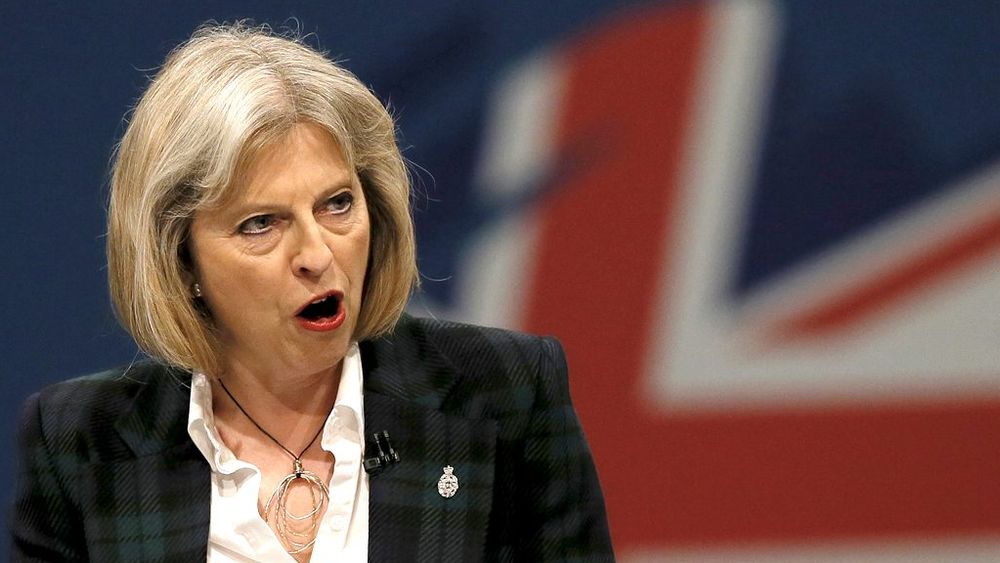With every day that goes by without a firm Brexit deal and plan for how the UK is going to leave the EU, businesses are having to make decisions based on the very little information they do have if they are to safeguard their supplies once the March 29, 2019 Brexit deadline passes.

Will she or won’t she be able to get the Brexit deal she wants or the country needs?
If you happen to live in the UK – or Europe for that matter –it’s hard to wake up without being hit by the latest avalanche of Brexit news. Whether you’re a Remainer or a Leaver, or a Don’t Care-er, it’s impossible to ignore.
In fact, I have started the rather frustrating habit of humming the opening bars to Danny Boy every time I read the latest report that hammers another nail into the No Deal coffin. A coffin that seems increasingly likely to be fully nailed down by March 29, 2019 and the day the UK officially leaves the EU. “The pipes, the pipes are calling” indeed.
For the wine industry those pipes are starting to sound more like fog horns as we are now four months away from the infamous Brexit becoming a reality unless there is a major political u-turn, fall out or call for a second referendum. For wine buyers that means decisions are having to be made now, if they have not been done so already, about where major retailers, importers and distributors are going to go to get their wine from inApril, 2019.
Decisions those buyers have been dreading to make for months as the Brexit negotiations have become as clear as a pea soup fog across the Channel.
Buying conundrum
Where do you go to get your wine? You could play your cards now and lock down prices and supply from Europe and make sure you get it, somewhere, somehow, into the country before March 29. But what if there is a breakthrough in talks and the market responds positively and the rate of sterling versus the euro starts to bounce back? You could quickly and easily be the wrong side of any currency swerve.
If you are worried about having the right levels of stock in the right part of the supply chain, then surely it makes sense to put more of your cards into non-EU wine producing countries. So why not fill your shelves and lists even more with New World classics from Chile, to California, via South Africa, Australia and New Zealand?
Particularly as reports are starting to leak out from the government’s own departments about how bad things could get if the UK falls out of the EU on March 29.
Leading political commentator, Robert Peston, of ITV News wrote recently about how “a shocked Cabinet was today told of Department of Transport contingency plans to own or lease roll-on roll-off lorry ferries to make sure vital supplies of goods, food and medicines continue to reach these shores if the UK leaves the EU without a deal”.

ITV’s political commentator Robert Peston
Before adding: “According to work commissioned by Chris Grayling, the transport secretary, a possible French decision to reintroduce customs checks could reduce freight coming into the UK via Dover and the Channel Tunnel by around 85%.”
As a result the government is said to be looking at how it can open up other ports, like the Port of London, Tilbury and Liverpool, to help cope with the backlog.
To which a leading government minister is said to have told Peston: “It’s the kind of stuff governments do in a time of war. It is as serious as that”.
Even if things are agreed by March 29, Miles Beale, chief executive of the Wine & Spirit Trade Association, points to a National Audit Office report that states: “Even with a withdrawal agreement, significant challenges lie ahead to ensure the UK border is fully functioning.”
Whilst The Times is reporting the government quietly expects any Brexit deal to involve a “long-running” transition period that could stretch for many years – at least four -leaving us all in a sort of vacuum of decision making.
The clear message – if there is such a thing – from the currency markets is that there is a mass treading of water going on, where there might be a movement or a cent or two week by week, but for now everyone is watching and waiting.
Currency shifts

There are fears there could be a run on sterling if no Brexit deal is decided
But as soon as we know where we really are with Brexit, there will equally be a mass front crawl of investors and analysts looking to buy and sell, that will send an electric shock through the currency markets.
Currency analysts are starting to break ranks to come clean with where the markets are likely to go. Take Thu Lan Nguyen at Commerzbank, who said: “We can expect larger moves on sterling if we really get an end to negotiations, and I mean really the end, which is either a signed deal or not.”
Perhaps more significantly Jon Cunliffe, deputy governor of the Bank of England, said last month that sterling’s current value – which is around 13% down on where it was against the euro prior to the 2016 referendum – could see a “big fall” if the “number of Brexit outcomes” go the wrong way in the eyes of the financial markets.
He told the House of Commons Treasury Committee last month that “at some point when the true Brexit is revealed – it’s not a single event but it will happen quite clearly – then I’m pretty sure we’ll see the exchange rate move.”
Before adding: “There’s been more people trying to protect themselves from a fall, so that suggests if a kind of bad Brexit outcome happens, we’ll see something on the exchange rate. Arguably there’s more pessimistic expectation in there now than there was at the referendum – you could see a big fall.”
Unprecedented times
We really do live in unprecedented times when analysis from financial experts, Bloomberg, says the median estimate amongst the major currency houses is that the pound could drop about 8% if the UK crashes out of the EU without a deal.
Rabobank, which is one of the few financial institutions to watch the global wine market closely, predicts sterling could drop 13% against the dollar on the back of a no deal.
Or, alternatively, sterling, say the currency gurus, could just as easily jump 6% if the Prime Minister Theresa May’s negotiations wins the day and gets a deal agreed by both Brussels and Westminster.
Here’s how Dan Hanson of Bloomberg Economics sums up the situation: “The level of sterling won’t prevail once the outcome of the Brexit negotiations becomes clear. Deal or no deal, the pound will shift and take the inflation forecasts with it.”
High buying stakes

Andrew Bewes says Hallgarten & Novum Wines is going to have £1m of additional stock in the UK ahead of Brexit
Those are the kind of stakes that wine buyers are having to grapple with regardless of the size of harvests in the northern or southern hemisphere.
There is talk of some major UK supermarkets looking at further range culls – with one chain expected to announce up to 250 wines being taken out – as they look to limit the exposure they have over the coming months.
Andrew Bewes, managing director of Hallgarten Novum Wines, has told The Buyer that it is planning on having an additional £1m of stock in the UK ahead of Brexit to see it through the first eight weeks after the March 29 deadline. It will also be looking to “secure” enough currency to keep its prices levels through to July when it will have to look again and see what sort of situation we are in then.
Majestic hit the national press last week with news that it is to stockpile an additional £5-8m of extra stock, or 1 million bottles, from the EU to also hopefully guide itself through the first couple of months post Brexit. Other retailers must be doing the same, or looking to do so.
It is all starting to feel like the last few hours of the Titanic when it dawns on the crew that there are not enough life jackets and lifeboats to go around.
Even when you think there is help to hand, it just results in more head scratching. Like the UK government’s new 48 page guide to help businesses prepare for a potential ‘No Deal’ Brexit – entitled Partnership pack: preparing fora ‘No Deal’ EU Exit.
Which on paper looks, at last, like some clarity on the issue. Perhaps not. If you can face sifting through the bureaucrat speak you end up with this summary: “Before importing goods from the EU, you need to register for a UK Economic Operator Registration and Idenfiticaion (EORI) number. You don’t need to do anything now. There will be further information available later in the year.”
But to get that information it advises you to “sign up for EU Email updates. You will be contacted when this becomes available”.
It also re-confirms that the current computer system – ECMS, the Excise Movement and Control System – that everyone currently relies on for the smooth movement of goods between the UK and Europe is to be scrapped. Instead “movements of excise goods to the UK will require an export declaration as well as an electronic administrative document (e-AD).”
What is going to replace ECMS is still unknown, probably undecided, and certainly not built or ready to put into action.
So, yes, the pipes the pipes are a calling.
- This is an adapted article that first appeared on VINEX, the bulk and bottled wine trading site.


































